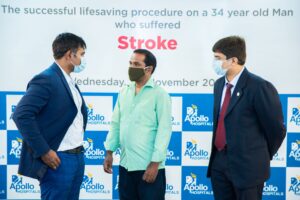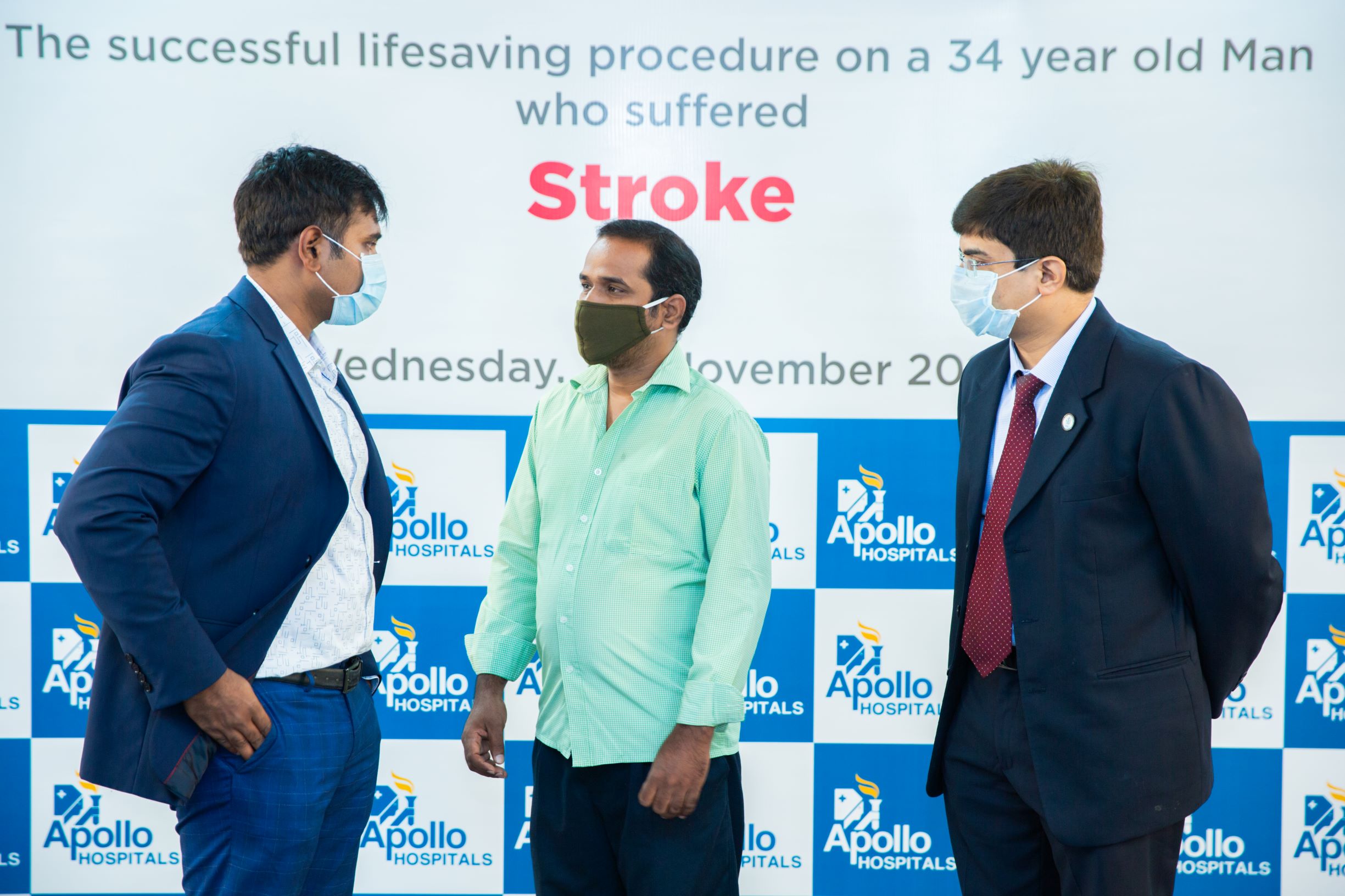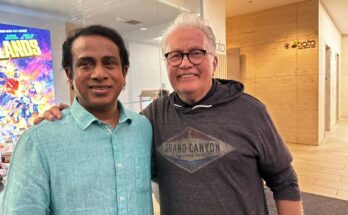Stroke cases see a surge in Chennai during the Pandemic, Apollo Hosptials OMR saved more than 250 patients
Apollo Hospitals Gives New Lease of Live to Young Stroke Patients
Chennai 18th November 2020: Stroke cases see a surge in Chennai during the Pandemic, Apollo Hosptials OMR saved more than 250 patients between 20 to 80 years of age, from paralysis caused due to Stroke within a span of an eleven months since January 2020. Added stress due to extended lockdown has also been considered as a contributing factor in stroke among young people.
According to the Indian Stroke Association, 17 million people suffer a stroke each year of which six million die and five million remain permanently disabled. Additionally, 80% of stroke deaths occur in lower- and middle-income countries including India due to inadequate preventive and stroke management facilities. Stroke cases have surged due to various factors including sedentary lifestyle, hypertension, smoking and obesity during this pandemic. Apollo Specialty Hospitals, OMR receive more than 250 stroke patients in the past eleven months, and most of them are under 40 years of age.
Around 25 patients were admitted to Apollo Speciality hospitals OMR on an average per month, amongst that 40% of the patients were between 20 to 40 years of age. Majority of stroke (85%) occurs when blood stops flowing to a part of the brain due to a clot or thrombus, usually referred to as stroke. This interruption in blood flow leads to damage to the surrounding brain cells.
Mr. Santosh (Name changed), a 34 year old software engineer from Chennai observed intermittent weakness of his left hand which he ignored assuming it to be tiredness. He observed similar weakness in his left leg few months later and visited his family physician. He was alerted as these were the symptoms of stroke and he was brought to Apollo Hospitals OMR for further treatment. He was evaluated by Dr. Karthikeyan, Interventional Neurologist, Apollo Hospitals OMR, who confirmed that these episodic weakness of left hand and leg were strokes (also called as transient ischemic attacks). He then performed various investigations to find out the cause for these symptoms.
 From Left to Right : Dr. Karthikeyan, Interventional Neurologist, the Patient and Dr. Roopesh kumar Senior Neurosurgeon.MRI scan of the patient’s brain showed that the right side of brain was not getting enough blood supply and there were multiple scars due to reduced blood flow. Brain angiogram was then performed which showed that the main channel supplying blood from the heart to the brain was completely blocked at the site where it enters the skull. There was some compensation of flow from the left side which was not sufficient. The patient was started on me dications to prevent further blockage of channels and to enhance smooth flow of blood to brain (blood thinners). The problem was so severe that the medication did not help, specialists at Apollo decided to augment the blood flow to his right side brain through a bypass surgery.
From Left to Right : Dr. Karthikeyan, Interventional Neurologist, the Patient and Dr. Roopesh kumar Senior Neurosurgeon.MRI scan of the patient’s brain showed that the right side of brain was not getting enough blood supply and there were multiple scars due to reduced blood flow. Brain angiogram was then performed which showed that the main channel supplying blood from the heart to the brain was completely blocked at the site where it enters the skull. There was some compensation of flow from the left side which was not sufficient. The patient was started on me dications to prevent further blockage of channels and to enhance smooth flow of blood to brain (blood thinners). The problem was so severe that the medication did not help, specialists at Apollo decided to augment the blood flow to his right side brain through a bypass surgery.
A brain bypass surgery is not commonly performed for stroke, considering the patient’s condition a team of doctors led by senior Neurosurgeon, Dr.Roopesh kumar, Senior Neurosurgeon, Apollo Hospitals OMR cond ucted a brain bypass surgery, where one of the blood channels feeding the skin was diverted to brain through a microscopic procedure. The surgery which lasted for 5 hours was successfully performed and the right side brain received more blood.
Speaking about this surgery, Dr. Roopesh Kumar, Senior Neurosurgeon, Apollo Hospitals OMR, said “Such bypass procedure to brain is exceedingly challenging as the normal stitches which are made to join blood channels does not hold well in brain channels due to inherent weakness of the wall in the brain. However with recent advancements, it could be made possible. Bypass surgery to the brain though very uncommonly done, can save patients if the decision is made at the right time for well indicated patients. It is a challenging procedure done in select few centers in the country and with recent development of surgical skills and infrastructure, such procedures can be successfully performed translating to good patient outcomes. Mr. Santosh, (name changed) recovered well from the surgery and joined back his duties after a month. His left hand and leg weakness recovered completely and he is doing well without any problems.”
Similarly, Ms. Lakshmi (Name Changed), a 24 –year-old female was brought to Apollo Hospitals OMR recently in an unconscious state and with complete weakness of limbs and extreme breathlessness. On conducting a brain CT scan the doctors identified that she had a bilateral vertebral artery dissection. The patient immediately underwent a Mechanical Thrombectomy procedure in which blood clot was removed from one of the major artery and the blood flow to her brain was restored.
Speaking about this procedure, Dr. S. Karthikeyan, Interventional Neurologist, Apollo Hospitals OMR said, “To our knowledge this is the first case report of mechanical thrombectomy done in bilateral vertebral artery dissection in our country and only very few patients have survived such attacks globally. Time is the most important factor in saving a stroke patient from a lifetime disability, she reached our hospital at the right time and since we were equipped with the facility to perform a Mechanical Thrombectomy we were able to help her get her normal life once again. We used Mechanical Thrombectomy to treat most of our patients while in a few we also used intravenous thrombolysis, which helps in lysing the blood clot. After these procedures, all these patients recovered remarkably.”
Dr. Karthikeyan also added, “Stress, Lifestyle changes and dietary habits appear to be the main cause of brain diseases. Youngsters follow a frantic lifestyle spending more than 12 to 14 hours at work including late night and sleep deprived shifts. With the Covid-19 pandemic the stress levels of employed individuals especially women who manage home and official work has extremely risen. On the other hand youngsters also cause more harm to themselves by eating junk foods, smoking and alcohol abuse. These are observed as some of the causes of stroke in young people, genetic factors, coagulation disorder, vasculitis and dissection could also be the cause. ”




